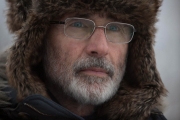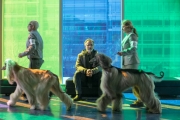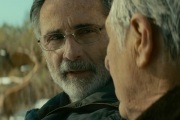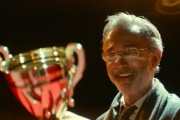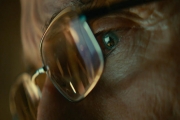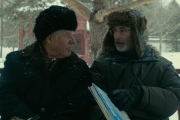![]() Presentation by and discussion with director and screenwriter Thomas Vincent
Presentation by and discussion with director and screenwriter Thomas Vincent
After a highly uncommon accident, Paul Sneijder opens his eyes to the reality of his life as a CEO in Montreal: his work no longer interests him, his wife annoys him and cheats on him, his two sons despise him . . .
How can he keep living in these conditions? For a start, he can change jobs and become a dog-walker, for example!
Will his family and friends accept this change that will transform him into a free man?
Cast & Crew
Director • Thomas Vincent
Director of Photography • Ronald Plante
Screenwriters • Yaël Cojot-Goldberg and Thomas Vincent
Based on Jean-Paul Dubois’ novel Le Cas Sneijder
Music composers • Philippe Deshaies, Lionel Flairs, Benoît Rault and Antoine Bedard
Producers • Pierre Forette, Thierry Wong, André Rouleau and Valérie d’Auteil
Starring :
Thierry Lhermitte, Géraldine Pailhas…
Choose a picture to see the filmography (source : IMDB)
![]()
When did you decide to adapt Le Cas Sneijder, the novel by Jean-Paul Dubois, and why?
Jean-Paul Dubois’ books are like Woody Allen’s films; right from the first few seconds, you know exactly where you stand; you are immediately caught up in a sort of charm. Every time I have read one of his books, I have asked myself whether it could be adapted for the cinema or not. By me or not? When Le Cas Sneijder came out in 2011, it was Yaël Dojot-Goldberg, my wife and co-writer, who read it first. When she closed the book, she said, “this one is for you”. There is definitely something in the main character that is desperate, with a sort of ironic distance from the world – which I have, by the way. I liked the fact that the story took place in Quebec, in the snow; it gave it a metaphoric strength that it would not have had otherwise, a bit like being removed from reality while you are still in reality. Finally, there was that great quality that is omnipresent in Dubois’ work, his ability to make you laugh about the saddest things and vice-versa.
Do you feel that one of the interesting elements of this story lies in the gap that exists between drama and certain comical situations?
Humour is obviously a defence against anxiety and the idea of death. It is difficult to talk about such serious subjects as mourning, guilt, cowardice or resignation in the first degree if you are close to these subjects. Some directors – such as Haneke – can achieve this magnificently. I prefer to establish a close camaraderie with the spectator. Woody Allen and Dubois succeed in creating a feeling of intimacy in the drama, like a friendly discussion and I really like that approach. Like saying; OK, it is all going wrong, history will not be kind to us but we can talk about it, without being bombastic, with humaneness, indulgence and above all with a good dose of self-deprecation.
Do you agree with Jean-Paul Dubois when he states that elevators form the backbone of the modern world? Is not an elevator unnatural insofar as it should do the opposite?
Elevators are one of those personifications of the absurdity of piling people on top of each other and then having to build elevators to carry them up. But the debate between natural and unnatural is not what I obsess about most. It is managerial idiocy that upsets me, the “managerisation” of the world that really chokes me. Sneijder was an agent of all that for his whole life, he was a good little worker, he denied himself, he denied his daughter and his family. He was a coward for a very long time and the story of the film is how – all of a sudden – his cowardice is flung in his face, how he reacts and how he decides to change.
Was the shooting complicated by the bad weather?
During the preparation, the temperature dropped to -30°. We filmed in temperatures varying between -15° and -20°. For example, we wore shoes with heated soles that could be adjusted using a remote control. In spite of that, shooting in extreme cold is far harder than shooting in the heat. You cannot get used to it. Time goes slower, you want to get it over with, you have to resist the temptation to botch it to get home faster and warm up.
At the beginning of the film, the snow that covers the city gives the impression of greyness, almost like black and white – it makes everything look uniform. Was that intentional?
The standardisation of a world where nothing sticks out is an important theme in the film. Paul’s children, their mother’s golems, are in their school uniform. Anna, his wife, applies the principles of corporate life to their private life. Their house looks like a show home, standard. Nothing has any personality, just functionality, everything is normal. Paul even describes his family as a limited company. I like the double meaning of that phrase.
Why did you choose Thierry Lhermitte to play Paul and what did you tell him about the character, what did you expect of him?
Thierry is a Dubois fan, he belongs to the community, the “Duboisienne religion”. He had therefore read the book well before the screenplay. When we met, I explained which direction I intended to take, how and why. He agreed with all my ideas, as if they were obvious. In fifteen minutes, we agreed on everything – or nearly. Our relationship followed the same pattern, very straightforward, never confrontational. However, I could see that there was a great distance between where I was taking him and where he would have gone himself. But he was totally loyal, I felt that he trusted me.
How did you direct him?
Thierry always accepted my instructions with great modesty for an actor who has achieved so much. He agreed to enter into the character, to forget himself. I consider that to be an ethical performance as well as an artistic one. He did me a great honour.
Why did you choose to frame him in your shots by using close-ups?
I implemented a very particular visual grammar. The lenses I used were also used by Polanski for Chinatown and more recently by Nolan for Inception. They give this incredible immersive effect. I wanted the film to unfold through Paul’s point of view, close to him, close to his soul.
Who are the amazing actors from Quebec, how did you choose them?
His new family… thanks to them, he regains his humanity. Pierre Curzi – who we have also seen in The Decline of the American Empire among other films – adds a certain ambiguity: he adds a lot of empathy to his character and yet, if we look more closely, his physique would be better suited to a role in The Godfather. I love this contrast. I saw Guillaume Cyr – who plays Charisteas, the boss of the dog-walkers company – in French Canadian films. He is a huge comedy actor, just like his build. We had a lot of laughs creating this hybrid character, a giant bordering on autism.
Could you tell us about the work you did on the soundtrack, which sustains the tension in your subject?
Originally, I did not imagine anything accompanying the film. I discovered the Canadian group, Timber Timbre by chance on the radio then I forget about them. During the preparation, I heard another number by this group in a taxi in Montreal and once I had the décor, it became obvious. The cocktail of depressive weightlessness and humorous distance was the perfect match for my subject, intentionally offbeat. “Beat the drum slowly”, the first song in the film, then “Bring me Simple Men” are by this fantastic Canadian group, as are several other numbers in the film. The rest of the music was mainly composed by a French trio called Hit’n’Run, who also composed the soundtrack for Combattants. They add a touch of electro which allows the dramatic side of the film to be brought forward, without descending into pathos. A highly accurate piece of composing!
Are there any lift noises or creaky cables in this oppressive soundtrack?
Yes there are, mixed in with other things. I have always worked with Olivier Dô Hùu, the mixer and we enjoy working with sounds that you cannot necessarily identify but which are part of the construction of the film. They are underlying, like a noise carpet which you don’t necessarily notice but which forms a texture, a bit like tinnitus that lets us share Paul’s mental state. We feel what he is feeling – or at least I hope so!
Is part of you in this film, what is like you?
Everything. Starting with the main character, his realistic and evasive side. I also share his cowardice and his capacity for resistance. His outlook on the world is mine. La Nouvelle Vie de Paul Sneijder is the film I always dreamed of making. I have made it and I am very happy. I am totally at one with him.
Press Kit “La nouvelle vie de Paul Sneijder”
French ~ 15 pages ~ 848 Ko ~ pdf








